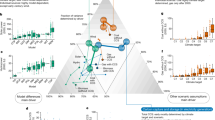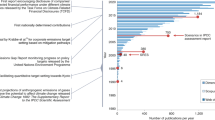Abstract
Scenarios are widely used for long-term climate and energy analysis. However, in the great majority of studies with a handful of scenarios or scenario categories, both scenario developers and users capture only a subset of future uncertainties. We propose three focal points for reinvigorating the scenario technique to expand uncertainty consideration: (1) to ensure that scenario developers embrace an increased space of multidimensional uncertainties, (2) to facilitate the process of scenario users capturing this space, and (3) to evaluate and iteratively revise the improvement progress. If these focal points are adopted, scenario studies in climate and energy analysis shall not simply stop after producing scenarios, but shall continue with techniques to facilitate elicitation of user-specific insights, as well as evaluation of both scenarios and scenario techniques.
Similar content being viewed by others
References
Alcamo J (ed) (2008) Environmental futures: the practice of environmental scenario analysis. Elsevier, Amsterdam
Bankes S (1993) Exploratory modeling for policy analysis. Oper Res 41:435–449
Bazilian M et al (2012) Open source software and crowdsourcing for energy analysis. Energ Policy 49:149–153. doi:10.1016/j.enpol.2012.06.032
Bistline J, Weyant J (2013) Electric sector investments under technological and policy-related uncertainties: a stochastic programming approach. Clim Chang 121:143–160. doi:10.1007/s10584-013-0859-4
Bryant BP, Lempert RJ (2010) Thinking inside the box: a participatory, computer-assisted approach to scenario discovery. Technol Forecast Soc Chang 77:34–49. doi:10.1016/j.techfore.2009.08.002
Craig PP, Gadgil A, Koomey JG (2002) What can history teach us? A retrospective examination of long-term energy forecasts for the United States. Annu Rev Energy Environ 27:83–118. doi:10.1146/annurev.energy.27.122001.083425
EEA (2009) Looking back on looking forward: a review of evaluative scenario literature. EEA Technical Report No 3/2009. European Environment Agency, Copenhagen
EMF (2014) Energy Modeling Forum. https://emf.stanford.edu/. Accessed 18 Jan 2016
Girod B, Wiek A, Mieg H, Hulme M (2009) The evolution of the IPCC’s emissions scenarios. Environ Sci Pol 12:103–118. doi:10.1016/j.envsci.2008.12.006
Groves DG, Bloom EW, Lempert RJ, Fischbach JR, Nevills J, Goshi B (2014) Developing key indicators for adaptive water planning. J Water Resour Plan Manag: 05014008–05014001 – pp 05014008–05014010 doi:10.1061/(ASCE)WR.1943-5452.0000471
Guivarch C, Schweizer V, Rozenberg J (2014) Enhancing the policy relevance of scenarios through a dynamic analytical approach. In: Proceedings of the 7th International Congress on Environmental Modelling and Software: Bold Visions for Environmental Modeling, iEMSs 2014, San Diego, June 2014, pp 710–714
Hall JM, Lempert R, Keller K, Hackbarth A, Mijere C, McInerney D (2012) Robust climate policies under uncertainty: a comparison of Info-Gap and RDM methods. Risk Anal 32:1657–1672
IPCC (2014) Intergovernmental Panel on Climate Change Fifth Assessment Report. Intergovernmental Panel on Climate Change, Geneva
Kann A, Weyant J (2000) Approaches for performing uncertainty analysis in large-scale energy/economic policy models. Environ Model Assess 5:29–46. doi:10.1023/A:1019041023520
Lemoine D, McJeon HC (2013) Trapped between two tails: trading off scientific uncertainties via climate targets. Environ Res Lett 8:034019. doi:10.1088/1748-9326/8/3/034019
Lempert RJ (2007) Can scenarios help policymakers be both bold and careful? In: Fukuyama F (ed) Blindside: how to anticipate forcing events and wild cards in global politics. Brookings Institute, Washington, DC
Lempert R (2013) Scenarios that illuminate vulnerabilities and robust responses. Clim Chang 117:627–646. doi:10.1007/s10584-012-0574-6
Lempert RJ, Popper SW, Bankes SC (2003) Shaping the next one hundred years: new methods for quantitative, long-term policy analysis. Rand Pardee Center, Santa Monica, CA
McInerny GJ, Chen M, Freeman R, Gavaghan D et al (2014) Information visualisation for science and policy: engaging users and avoiding bias. Trends Ecol Evol 29:148–157. doi:10.1016/j.tree.2014.01.003
McJeon HC, Clarke L, Kyle P, Wise M, Hackbarth A, Bryant BP, Lempert RJ (2011) Technology interactions among low-carbon energy technologies: what can we learn from a large number of scenarios? Energy Econ 33:619–631. doi:10.1016/j.eneco.2010.10.007
McMahon R, Stauffacher M, Knutti R (2015) The unseen uncertainties in climate change: reviewing comprehension of an IPCC scenario graph. Clim Chang 133(2):1–14. doi:10.1007/s10584-015-1473-4
Morgan MG, Keith DW (2008) Improving the way we think about projecting future energy use and emissions of carbon dioxide. Clim Chang 90:189–215. doi:10.1007/s10584-008-9458-1
New M, Hulme M (2000) Representing uncertainty in climate change scenarios: a Monte-Carlo approach. Integr Assess 1:203–213. doi:10.1023/A:1019144202120
O’Neill BC et al (2014) A new scenario framework for climate change research: the concept of shared socioeconomic pathways. Clim Chang 122:387–400
Parker AM, Srinivasan SV, Lempert RJ, Berry SH (2014) Evaluating simulation-derived scenarios for effective decision support. Technol Forecast Soc Chang. doi:10.1016/j.techfore.2014.01.010
Parson EA, Burkett V, Fisher-Vanden K, Keith D, Mearns L (2007) Global-change scenarios: their development and use. US Climate Change Science Program synthesis and assessment product 2.1b. US Climate Change Science Program, Washington, DC
Pidgeon N, Fischhoff B (2011) The role of social and decision sciences in communicating uncertain climate risks. Nat Clim Chang 1:35–41
Pidgeon N, Demski C, Butler C, Parkhill K, Spence A (2014) Creating a national citizen engagement process for energy policy. Proc Natl Acad Sci 111:13606–13613. doi:10.1073/pnas.1317512111
Postma TJBM, Liebl F (2005) How to improve scenario analysis as a strategic management tool? Technol Forecast Soc Chang 72:161–173
Rozenberg J, Hallegatte S, Vogt-Schilb A, Sassi O, Guivarch C, Waisman H, Hourcade J-C (2010) Climate policies as a hedge against the uncertainty on future oil supply. Clim Chang 101:663–668. doi:10.1007/s10584-010-9868-8
Rozenberg J, Guivarch C, Lempert R, Hallegatte S (2014) Building SSPs for climate policy analysis: a scenario elicitation methodology to map the space of possible future challenges to mitigation and adaptation. Clim Chang 122:509–522. doi:10.1007/s10584-013-0904-3
Rumsfeld D (2002) DoD news briefing: Secretary Rumsfeld and Gen. Myers, 12 February 2012. http://archive.defense.gov/transcripts/transcript.aspx?transcriptid=2636. Accessed 18 Jan 2016
Schweizer V, O’Neill B (2014) Systematic construction of global socioeconomic pathways using internally consistent element combinations. Clim Chang 122:431–445. doi:10.1007/s10584-013-0908-z
Shaw A, Sheppard S, Burch S, Flanders D et al (2009) Making local futures tangible: synthesizing, downscaling, and visualizing climate change scenarios for participatory capacity building. Glob Environ Chang 19:447–463. doi:10.1016/j.gloenvcha.2009.04.002
Shell (2012) 40 years of Shell scenarios. http://www.shell.com/energy-and-innovation/the-energy-future/shell-scenarios/earlier-scenarios.html. Accessed 18 Jan 2016
Spiegelhalter DJ, Riesch H (2011) Don’t know, can’t know: embracing deeper uncertainties when analysing risks. Philos Trans R Soc A Math Phys Eng Sci 369:4730–4750. doi:10.1098/rsta.2011.0163
Tietje O (2005) Identification of a small reliable and efficient set of consistent scenarios. Eur J Oper Res 162:418–432. doi:10.1016/J.Ejor.2003.08.054
Trutnevyte E, Stauffacher M, Scholz RW (2011) Supporting energy initiatives in small communities by linking visions with energy scenarios and multi-criteria assessment. Energy Policy 39:7884--7895. doi:10.1016/j.enpol.2011.09.038
Trutnevyte E (2013) EXPANSE methodology for evaluating the economic potential of renewable energy from an energy mix perspective. Appl Energy 111:593–601. doi:10.1016/j.apenergy.2013.04.083
van Notten P, Sleegers AM, van Asselt MBA (2005) The future shocks: on discontinuity and scenario developments. Futures 35:423–443
van Vuuren DP, Kok MTJ, Girod B, Lucas PL, de Vries B (2012) Scenarios in global environmental assessments: key characteristics and lessons for future use. Glob Environ Chang 22:884–895. doi:10.1016/j.gloenvcha.2012.06.001
van’t Klooster SA, van Asselt MBA (2006) Practising the scenario-axes technique. Futures 38:15–30. doi:10.1016/j.futures.2005.04.019
Weimer-Jehle W (2006) Cross-impact balances: a system-theoretical approach to cross-impact analysis. Technol Forecast Soc Chang 73:334–361. doi:10.1016/j.techfore.2005.06.005
White JWC, Alley RB, Archer DE, Foley J, Fu R, Holland MM et al (2013) Abrupt impacts of climate change: anticipating surprises. National Academy of Sciences, Washington, DC
WholeSEM (2014) IQ SCENE workshop website: Innovative techniques for Quantitative SCenarios in ENergy and Environmental research. http://www.wholesem.ac.uk/iq-scene/iq-scene. Accessed 18 Jan 2016
Wilkinson A, Eidinow E (2008) Evolving practices in environmental scenarios: a new scenario typology. Environ Res Lett 3:11. doi:10.1088/1748-9326/3/4/045017
Wong-Parodi G, Fischhoff B, Strauss B (2014) A method to evaluate the usability of interactive climate change impact decision aids. Clim Chang 126:485–493. doi:10.1007/s10584-014-1226-9
Acknowledgements
The UK Engineering and Physical Research Council WholeSEM outreach grant (Ref: EP/K039326/1) and CIRED enabled the collaboration of the authors in organizing the workshop “Innovative techniques for Quantitative SCenarios in ENergy and Environmental research: IQ SCENE” (WholeSEM 2014), 26–27 March 2014, University College London. The authors thank over 30 workshop participants for their active contributions as well as the anonymous manuscript reviewers for constructive feedback.
Author information
Authors and Affiliations
Corresponding author
Rights and permissions
About this article
Cite this article
Trutnevyte, E., Guivarch, C., Lempert, R. et al. Reinvigorating the scenario technique to expand uncertainty consideration. Climatic Change 135, 373–379 (2016). https://doi.org/10.1007/s10584-015-1585-x
Received:
Accepted:
Published:
Issue Date:
DOI: https://doi.org/10.1007/s10584-015-1585-x




